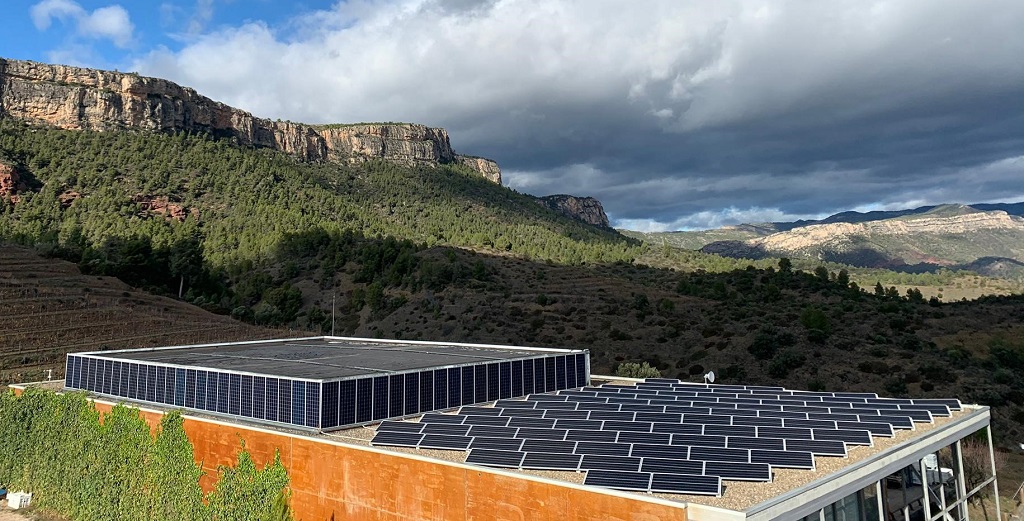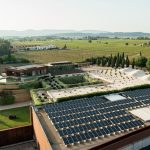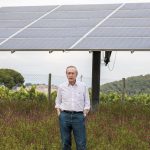Familia Torres has revised upwards its CO2 emissions-per-bottle target for 2030, setting it at a minimum of 60% with respect to 2008, with the goal of reaching 70% thanks to the reforestation project in Chilean Patagonia. The wine producer is thus redoubling its environmental commitment to contribute to mitigating the climate crisis and move towards emission neutrality before 2040. According to the audited balance sheet of the carbon footprint for 2020, Familia Torres has already reduced its CO2 emissions per bottle by 34% across its entire scope, including both direct emissions as well as indirect emissions generated by grape growing, wine production and bottling, distribution, consumption, and waste generated after consumption.
The factors that have contributed most to this reduction of emissions have been the increased use of renewable energy sources by the company and its suppliers – Familia Torres currently produces 30% of the energy it consumes at its Pacs del Penedès winery – as well as the increased use of the biomass boiler installed at this winery, which has made it possible to eliminate practically all natural gas consumption. Moreover, energy efficiency measures have been implemented at all facilities and remote working has been introduced, with the consequent reduction of travel and business trips, a trend that will possibly remain in place even after the pandemic.
According to Miguel A. Torres, president of Familia Torres: ‘Even though it’s been an atypical year due to the restrictions imposed by the pandemic, we’ve continued making efforts not only to reduce our CO2 emissions but also to absorb CO2 from the atmosphere through reforestation. We’ve also started a regenerative vine-growing project with the aim of incorporating carbon into the soil and for this to contribute by reducing our emissions by 2% or 3%’.
The Torres & Earth programme, launched by Miguel A. Torres in 2008 with the commitment of earmarking 11% of profits each year, is structured around three pillars: reducing emissions, adapting to the new climate reality, and influencing the industry with initiatives such as the International Wineries for Climate Action (IWCA) association, co-founded by Familia Torres and Jackson Family Wines of California to drive the decarbonization of the industry at the global level. IWCA has become the first agri-food organization to be admitted to the United Nations’ Race to Zero campaign, and it already has 10 new members, including two Spanish wineries: Alma Carraovejas and Bodega Emina, from Bodegas Familiares Matarromera.
To reduce its emissions, Familia Torres promotes renewable energy sources, sustainable mobility, and energy efficiency, and it works closely with its suppliers to reduce bottle weight and the use of other auxiliary materials so that the carry-over emissions will be lower. For some years now, it has also been investing in researching and developing solutions to capture CO2 from fermentation and give it an alternative use; the company’s priority is to reuse it in the winery itself as an inert gas in the tanks, once the fermentation has finished, to keep the wine from oxidizing.
In parallel to the efforts to reduce its carbon footprint, Familia Torres contributes to absorbing CO2 from the atmosphere to compensate its emissions, using its own resources, through two key actions focused on land regeneration: on the one hand, reforestation – in Chilean Patagonia, Familia Torres has planted 80,000 ponderosa pine trees on a 70-hectare area, with the aim of planting 2 million trees in ten years – and, on the other, regenerative vine-growing that will allow the soil, in addition to being healthier and having more microbiodiversity and water retention capacity, to accumulate more carbon inside it (obtained from the CO2 in the air), contributing to reducing the levels of this greenhouse gas in the atmosphere (troposphere).
Among the environmental actions that Familia Torres will carry out in 2021, one highlight is the addition of the first electric tractor to harvest its estates in Penedès, with the intention of gradually replacing the entire fleet. Marimar Estate, the winery run by Marimar and Cristina Torres in California, will also add an electric and autonomous tractor for vine-growing this year, from the brand Monarch. This tractor is manufactured in the USA and was tested last March in the Marimar Estate vineyard.
Are you a Daily Wine News subscriber? If not, click here to join our mailing list. It’s free!





















